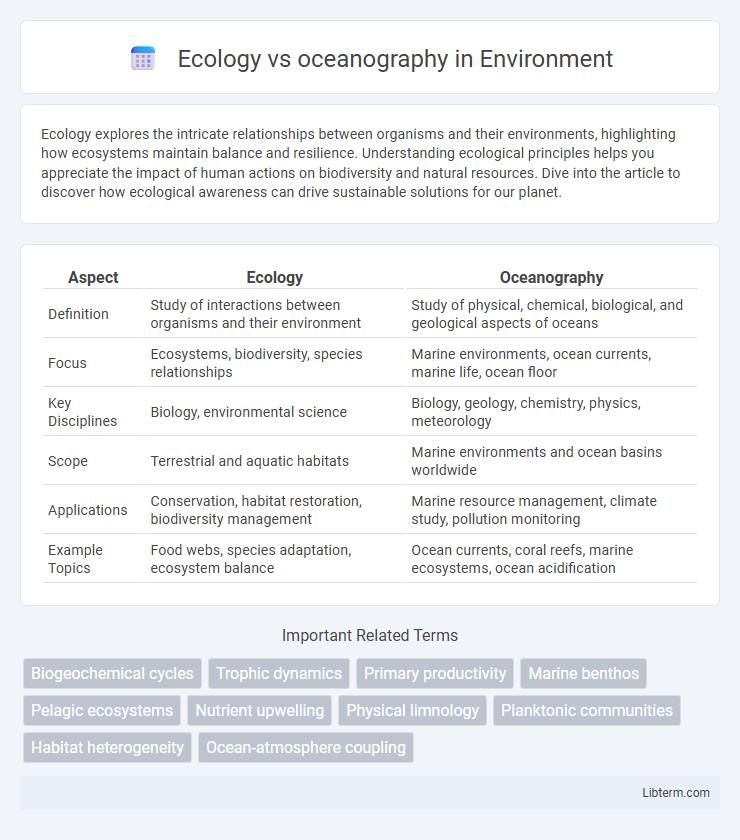Ecology explores the intricate relationships between organisms and their environments, highlighting how ecosystems maintain balance and resilience. Understanding ecological principles helps you appreciate the impact of human actions on biodiversity and natural resources. Dive into the article to discover how ecological awareness can drive sustainable solutions for our planet.
Table of Comparison
| Aspect | Ecology | Oceanography |
|---|---|---|
| Definition | Study of interactions between organisms and their environment | Study of physical, chemical, biological, and geological aspects of oceans |
| Focus | Ecosystems, biodiversity, species relationships | Marine environments, ocean currents, marine life, ocean floor |
| Key Disciplines | Biology, environmental science | Biology, geology, chemistry, physics, meteorology |
| Scope | Terrestrial and aquatic habitats | Marine environments and ocean basins worldwide |
| Applications | Conservation, habitat restoration, biodiversity management | Marine resource management, climate study, pollution monitoring |
| Example Topics | Food webs, species adaptation, ecosystem balance | Ocean currents, coral reefs, marine ecosystems, ocean acidification |
Defining Ecology and Oceanography
Ecology studies interactions among organisms and their environments, emphasizing energy flow, nutrient cycles, and population dynamics across ecosystems. Oceanography examines physical, chemical, geological, and biological properties of the ocean, including currents, marine chemistry, seafloor geology, and marine life. While ecology centers on relationships within living communities, oceanography integrates multidisciplinary approaches to understand ocean processes and marine habitats.
Core Principles of Ecology
Ecology centers on the relationships between organisms and their environments, emphasizing energy flow, nutrient cycles, and population dynamics. Core principles include the interdependence of species, ecosystem structure, and the impact of abiotic factors on living communities. Unlike oceanography, which studies physical, chemical, and geological aspects of oceans, ecology prioritizes biological interactions and environmental processes shaping ecosystems.
Fundamental Concepts in Oceanography
Fundamental concepts in oceanography encompass the study of physical, chemical, geological, and biological processes within marine environments, focusing on ocean currents, marine ecosystems, and biogeochemical cycles. Ecology examines the relationships between organisms and their environment, emphasizing species interactions, energy flow, and nutrient cycling in marine habitats. Integrating ecological principles with oceanographic data enhances understanding of marine biodiversity, ecosystem dynamics, and the impact of environmental changes on ocean health.
Key Differences Between Ecology and Oceanography
Ecology studies the relationships between organisms and their terrestrial or aquatic environments, emphasizing biodiversity, ecosystems, and environmental interactions. Oceanography focuses specifically on the physical, chemical, geological, and biological aspects of the ocean, including ocean currents, marine life, and marine geology. Key differences include ecology's broader scope across all habitats versus oceanography's specialization in marine systems and interdisciplinary approach combining biology, chemistry, and geology of oceans.
Areas of Overlap and Interdisciplinary Research
Ecology and oceanography intersect significantly in studying marine ecosystems, where ecological principles analyze species interactions while oceanography examines physical and chemical ocean processes. Interdisciplinary research integrates data on nutrient cycles, habitat dynamics, and ocean currents to understand biodiversity patterns and environmental changes. Joint efforts in monitoring climate impacts, such as ocean acidification and habitat loss, highlight the necessity of combining ecological insights with oceanographic methods for sustainable marine resource management.
Methods and Tools Used in Each Field
Ecology employs field surveys, remote sensing, and GIS mapping to study interactions among organisms and their environments, often using statistical models to analyze biodiversity and ecosystem functions. Oceanography utilizes specialized instruments like CTD sensors to measure conductivity, temperature, and depth, as well as satellite imaging, underwater drones, and sonar technology to explore physical, chemical, and biological processes in marine environments. Both disciplines integrate data analysis software and long-term monitoring systems, but oceanography emphasizes automated sampling equipment and vessel-based expeditions while ecology relies more on experimental plots and ecological modeling.
Major Discoveries and Breakthroughs
Ecology unveiled the intricate relationships between organisms and their environments, highlighted by discoveries such as the role of keystone species and ecosystem dynamics in maintaining biodiversity. Oceanography made breakthroughs in mapping the ocean floor through sonar technology and revealing deep-sea hydrothermal vents, which transformed understanding of marine ecosystems and geological processes. These major discoveries in both fields have significantly advanced knowledge on environmental interaction and Earth's biological and physical systems.
Career Paths in Ecology vs Oceanography
Ecology careers often involve roles such as wildlife biologist, environmental consultant, or conservation scientist, focusing on terrestrial and freshwater ecosystems. Oceanography career paths include marine biologist, oceanographer, and marine technician, specializing in the study of ocean environments and marine life. Both fields offer opportunities in research, education, and environmental management but differ in their primary ecosystems and specialized skill sets.
Environmental Impact and Conservation Efforts
Ecology examines the interactions between organisms and their environments, emphasizing the impact of human activities on biodiversity and ecosystem health. Oceanography studies the physical, chemical, and biological processes of the ocean, providing critical data on pollution levels, climate change effects, and marine resource depletion. Conservation efforts integrate ecological principles and oceanographic research to develop sustainable practices, protect endangered species, and restore habitat integrity in marine and coastal ecosystems.
Future Trends and Research Directions
Emerging research in ecology emphasizes the integration of climate change models to predict biodiversity shifts and ecosystem responses, while oceanography advances in deploying autonomous underwater vehicles and AI-driven sensors for real-time data acquisition, enhancing understanding of ocean circulation and biogeochemical cycles. Interdisciplinary collaborations are driving the development of coupled ocean-ecosystem models to forecast impacts of human activities, ocean acidification, and warming on marine habitats. Future trends prioritize sustainable management practices informed by high-resolution spatial and temporal datasets, aiming to protect marine resources and mitigate environmental stressors.
Ecology Infographic

 libterm.com
libterm.com